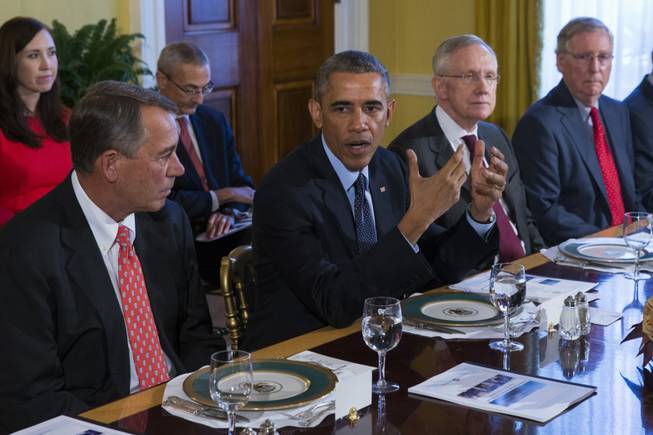
Evan Vucci / AP
President Barack Obama meets with congressional leaders in the Old Family Dining Room of the White House in Washington on Friday, Nov. 7, 2014. From left are House Speaker John Boehner of Ohio, Obama, Senate Majority Leader Harry Reid of Nevada, and Senate Minority Leader Mitch McConnell of Kentucky.
Wednesday, Nov. 12, 2014 | 2 a.m.
Starting today, Sen. Harry Reid has about six weeks left to run the U.S. Senate.
And he's got a long to-do list before he hands over power to Republicans.
In January, the Nevada Democrat will give up his majority leader title for the first time since ascending to it in 2007. Republicans, who commanded control of the Senate in the Nov. 4 midterm elections, will run the chamber for at least the next two years.
Here are five things Reid, who controls which bills and amendments get a vote, would like to get done in this lame-duck session.
Fund the government
Congress needs to pass a spending bill by Dec. 11 to keep the government running. (Remember the government shutdown last year?)
Reid has a few options for what kind of spending bill to bring to a vote: a year-long package that expires Oct. 1 or a short-term spending bill that ends in January and lets Republicans try to pass their own budget next year.
The former lets Senate Democrats have more control over the budget process; the latter gives Republicans more reign. Either way, he'll have to work with House Republicans to get things done, which could make things tricky if he wants to pass a longer spending bill.
Separately, Reid also needs to pass a bill authorizing annual spending for the Defense Department.
Pass Obama's nominees
Revamping Senate rules to make it easier for presidential nominations to pass the Senate will forever be part of Reid's legacy. (A move that could come back to bite him with Republicans in the majority.)
Even though most nominations no longer require a 60-vote, filibuster-proof majority, Republicans have slowed down the process for filling President Barack Obama's team. There are currently 50 nominations, including District Court judges and ambassadors, waiting to be approved by the Senate. Reid would like to fill as many as he can before Republicans take control.
The biggest question mark is whether Reid will try to push through Obama's nominee for attorney general, Loretta Lynch, during the lame-duck session. Republicans are adamantly opposed to such a move.
"No one has been nominated and confirmed to be attorney general in a lame-duck session since before the Civil War," noted Sen. Orrin Hatch, of Utah, in The Washington Times.
Extend tax breaks
There's one thing Republicans and Democrats probably can agree on: Congress should extend almost $85 billion in tax breaks for businesses and individuals.
Reid was pushing the package in May, before it expired, saying there are more than 50 tax breaks that affect Nevada residents, including a two-year extension on tax breaks for homeowners who have refinanced their mortgages.
The package does not include extending federal unemployment benefits for long-term unemployed Americans, which is a separate bill Nevada Republican Sen. Dean Heller is pushing.
Reid would also like to extend a tax break on all Internet purchases during the holiday season.
These tax breaks could run into glitches in the form of opposition from an odd-couple pairing of the White House and some Tea Party Republicans who don't want to add to the deficit.
Help Syrian rebels
Foreign policy is also on Reid's agenda, as Congress once again debates whether to authorize the U.S. military to train and equip Syrian rebels.
Before Congress left town in September, it passed a bill temporarily approving the United States' involvement but must do so again.
Reid has unfailingly supported Obama's decisions escalating military involvement in the Middle East, but the rest of Nevada's delegation is split on what to do. There's a chance Reid could push for an aid package for Ebola victims in Africa as well.
Wildcard legislation
Reid will also have to contend with Democrats who want to push their priorities through during the lame-duck session.
The chairs of all Senate committees will switch from Democrat to Republican come January.
Sen. Patrick Leahy of Vermont wants to use his last few weeks as chairman of the Judiciary Committee to try to pass controversial surveillance reform legislation that would curb the government's spying capabilities.
And Sen. Tim Kaine of Virginia is demanding votes to essentially authorize going to war with the terrorist group known as the Islamic State in the Middle East, an issue Congress has so far skirted.
All this means Reid has a busy and uncertain last few weeks running the Senate.

Join the Discussion:
Check this out for a full explanation of our conversion to the LiveFyre commenting system and instructions on how to sign up for an account.
Full comments policy